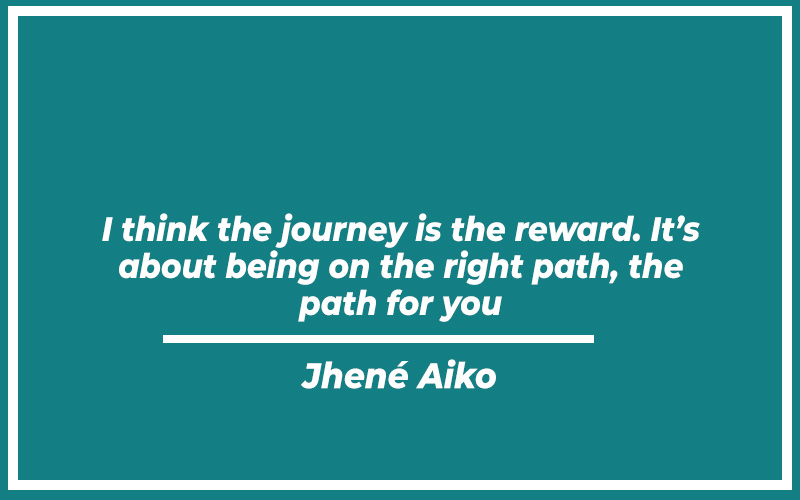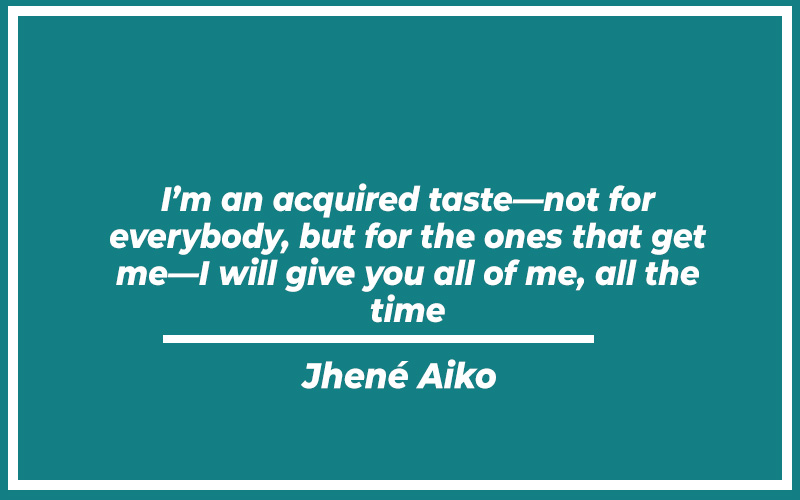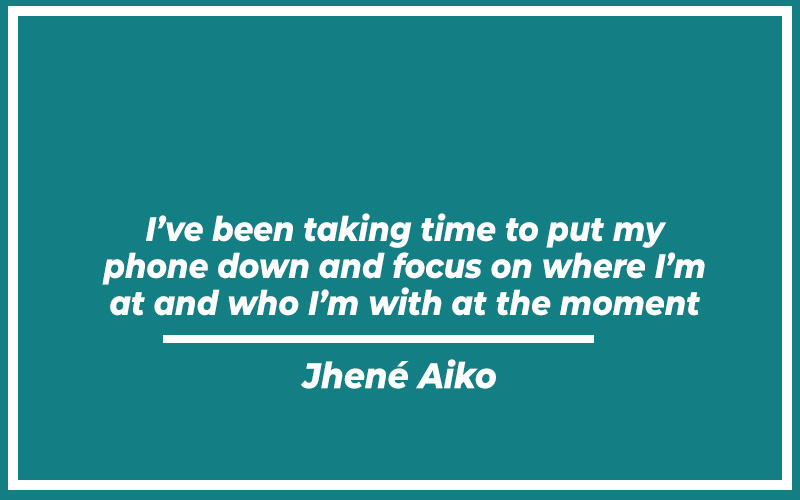Jhené Aiko’s quotes are like little life lessons. She talks about her own life, from her relationships to her inner thoughts. It’s not just about her career; she shares her ups and downs and how she stays true to herself.
Her words are straightforward and can make you think about your own life in a new way. Whether she’s sharing about tough times or the comfort music brings her, her words feel personal, like she’s talking just to you.
Best Jhene Aiko Quotes

“I think the journey is the reward. It’s about being on the right path, the path for you.” – Jhené Aiko
Jhené Aiko emphasizes life as a journey with intrinsic value in itself, not just the milestones or endpoints.
This perspective encourages embracing personal growth and finding one’s own path as the primary source of fulfillment. It’s a reminder that life’s true reward is the continual process of discovery and understanding oneself.
Also read: Put Yourself First Quotes (with Explanation)
“The beauty of music is that it can transform the mundane into the magical.” – Jhené Aiko
Aiko sees music as a transformative power, capable of turning everyday moments into magical experiences.
This belief underscores the potential of music to alter our perception and enhance our experiences, making the ordinary extraordinary through the emotional and evocative power of sound.
“With females in our generation, it seems like morals are just out the window. Materialistic things aren’t life. I’d rather walk in the rain with the man who treats me like a queen than ride in a Benz with a man who treats me like crap.” – Jhené Aiko
Aiko challenges the prioritization of materialism over moral values, advocating for relationships built on respect and genuine affection rather than material wealth.
This stance celebrates authenticity and emotional connection as essential to true happiness and fulfillment.
“Music has the power to heal and to connect us all.” – Jhené Aiko
Aiko believes in music’s dual capacity to heal individual wounds and bridge cultural or personal divides.
This quote captures her view of music as a universal language that can comfort, connect, and uplift humanity, transcending traditional barriers.
“No music while making love… the sound of the love being made is better than music.” – Jhené Aiko
This quote reflects Aiko’s appreciation for authenticity and genuine experiences, suggesting that the most profound and fulfilling moments are those that are natural and unadorned.
It emphasizes intimacy and real connection over external enhancements.
“Oblivion is kind of like nirvana, where you become nothing and you don’t have to suffer over and over again. You’re free to just be nothing.” – Jhené Aiko
Aiko delves into the concept of oblivion as a peaceful escape from the cyclic nature of suffering, similar to the spiritual state of nirvana.
This philosophical outlook invites contemplation on detachment and the liberation found in letting go.
“I just want to meet as many people as I can and talk with as many people as I can, but whatever allows me to do that then that’s my main goal. It’s just to understand as much as I can about life and how it happens.” – Jhené Aiko
Aiko expresses a profound desire to connect and engage with diverse individuals, viewing each interaction as an opportunity to deepen her understanding of life.
This approach highlights the value of open communication and lifelong learning through personal encounters.
“I’m probably my biggest critic. There’s nothing anyone can ask of me that I haven’t already asked of myself.” – Jhené Aiko
Aiko reveals her self-reflective nature, acknowledging that she holds herself to the highest standards.
This quote underscores the importance of self-awareness and the internal drive to evaluate and improve oneself. It suggests a deep commitment to personal growth, even in the absence of external pressures.
“Just be yourself and wear deodorant.” – Jhené Aiko
In her typical light-hearted tone, Aiko advises authenticity paired with practicality. This quote encourages staying true to oneself while also attending to basic social etiquettes like personal hygiene.
It’s a humorous reminder that being genuine doesn’t mean ignoring common societal norms.
“I think as a person, I have a whole bunch of different sides to me.” – Jhené Aiko
Here, Aiko speaks to the complexity of human identity, acknowledging that she, like everyone, possesses a multifaceted personality.
This recognition invites us to embrace our varied aspects, understanding that our diversity of experiences and feelings makes us who we are.
“What I’m working on right now is just surrendering to the moment and letting things happen.” – Jhené Aiko
Aiko discusses her approach to life, focusing on letting go of control and being present.
This perspective is about trusting the flow of life and finding peace in acceptance, rather than forcing outcomes. It’s a call to appreciate the now without constant manipulation of circumstances.
“Shame on you for staying the same.” – Jhené Aiko
Aiko challenges the notion of complacency in personal development.
This quote is a provocative call to action, urging individuals not to settle for stagnation but to continually evolve and improve. It reflects a philosophy that life should be a journey of constant growth and learning.
“You have gotta trust the signs. Everything will turn out fine.” – Jhené Aiko
Aiko conveys a message of optimism and faith in the universe.
This quote encourages believing in the signals life gives and maintaining a hopeful outlook on the future. It’s about the reassurance that, despite uncertainties, things will align for the best.

“I’m an acquired taste—not for everybody, but for the ones that get me—I will give you all of me, all the time.” – Jhené Aiko
Aiko acknowledges that her personality and art may not be universally appealing, which is a testament to her authenticity.
She offers a reminder that true connections are based on genuine understanding and acceptance, and for those who resonate with her, she promises complete sincerity and openness.
“My advice for women who are feeling insecure is to get off of social media and stop comparing yourself.” – Jhené Aiko
Aiko addresses the pressures of social media on self-esteem, especially among women. She advises distancing oneself from platforms that fuel comparisons and insecurity.
This quote is a reminder of the importance of focusing on self-acceptance and the detrimental effects of constantly measuring oneself against others.
“You know how a lot of people say, ‘I lose myself in music,’ or ‘I like to escape,’ but I want my music to be more of an awakening. I want it to make people to be aware of life; I don’t want my music to be a distraction. I want to light a path.” – Jhené Aiko
Aiko expresses her aspiration for her music to serve as an enlightening force rather than mere escapism.
She aims to inspire consciousness and reflection through her art, guiding listeners towards a deeper understanding of life and themselves.
“When I was younger, I didn’t have the chance to express myself, as I was just singing other people’s songs and singing their stories.” – Jhené Aiko
Reflecting on her early career, Aiko discusses the limitations she faced in expressing her true self through music.
This quote highlights the evolution of her artistic journey from performing others’ words to finding her own voice, underscoring the importance of authenticity in creative expression.
“Creativity is the way I share my soul with the world.” – Jhené Aiko
Aiko views her creative output as a deeply personal offering to the world.
This perspective on art as a soulful expression invites us to consider the intimate connection between an artist and their work, where creativity serves as a bridge between personal experiences and public engagement.
“I’m not a party animal. I’m a chill homebody. I like to watch movies and go out to eat. That’s my idea of a good time. I’m definitely able to be social.” – Jhené Aiko
In this quote, Aiko contradicts typical celebrity stereotypes, embracing her preference for quiet, simple pleasures over more extravagant social activities.
She emphasizes the value of genuine enjoyment and comfort, suggesting that contentment doesn’t require conforming to expected social norms.
“It’s actually harder for me to write when I’m happy, because I’m already in a good place and I don’t want to escape it.” – Jhené Aiko
Aiko shares a personal insight into her creative process, revealing that happiness can sometimes stifle her artistic drive.
This admission opens up a conversation about the complexities of creativity, suggesting that emotional struggles often fuel artistic expression more than contentment does.
“The way you feel is not my problem.” – Jhené Aiko
Jhené Aiko asserts a strong stance on personal boundaries in relationships, emphasizing that one should not be held accountable for another’s emotional state.
This quote champions the idea of emotional independence, encouraging individuals to take responsibility for their own feelings and not impose them on others. It’s a reminder that while empathy is valuable, preserving one’s emotional health by setting clear boundaries is equally important.
“Is it strange for me to say that if I were to die today, there’s not a thing I would change? I’ve lived well.” – Jhené Aiko
Reflecting a profound sense of contentment and peace with her life’s choices, Aiko expresses a rare satisfaction that many strive for.
This quote highlights the importance of living authentically and making choices that align with one’s true self. It suggests that a well-lived life is one filled with actions and decisions that one can look back on without regret.
“There’s no slowing down as the globe spins ‘round and ‘round. You gotta keep going.” – Jhené Aiko
Aiko comments on the relentless pace of life, advocating for resilience and continuous effort in the face of life’s unending challenges.
This quote serves as motivation to persist and adapt, emphasizing that just as the world continues to move, so too must we keep pushing forward despite difficulties.
“Growing up, I was always self-conscious and dealt with a lot of self-esteem issues.” – Jhené Aiko
Aiko shares her personal struggles with self-esteem during her youth, providing insight into the common challenges many face while growing up.
This quote is relatable and serves as a reminder that personal growth and confidence often come from overcoming such internal battles.
“I love to sit outside in silence, breathe, focus on a flower, or look at the sky.” – Jhené Aiko
Highlighting the simplicity and power of mindfulness, Aiko shares her personal practices for finding peace and grounding.
This quote encourages taking moments to connect with nature and the present moment, promoting mental health and well-being through simple, meditative practices.
“For me, I started writing poetry, or even journaling about it, when I was in elementary, and then I eventually started writing poetry.” – Jhené Aiko
Aiko traces her artistic roots back to her childhood, showing how early experiences with writing shaped her creative expression.
This quote underscores the value of journaling and poetry as outlets for personal exploration and expression, which can evolve into lifelong passions.

“I’ve been taking time to put my phone down and focus on where I’m at and who I’m with at the moment.” – Jhené Aiko
In an age of digital distractions, Aiko emphasizes the importance of being present.
Her practice of putting away digital devices to engage more fully with her surroundings and company speaks to the broader cultural need to reconnect with the physical world and live more mindfully.
“What you create for you, no one can take from you.” – Jhené Aiko
Aiko reflects on the lasting impact and personal significance of creative work.
This quote suggests that the things we create, whether they’re artworks, writings, or other forms of expression, become an indelible part of our legacy, immune to external appropriation or influence.
Also read: Life is Precious Quotes (with Explanation)
Final Thoughts
Jhené Aiko’s quotes really connect with you. She shares insights from her life that many of us find relatable.
Whether she’s discussing tough challenges or moments of peace, her words can make you feel seen and less alone. It’s like getting advice from a friend who really understands.

